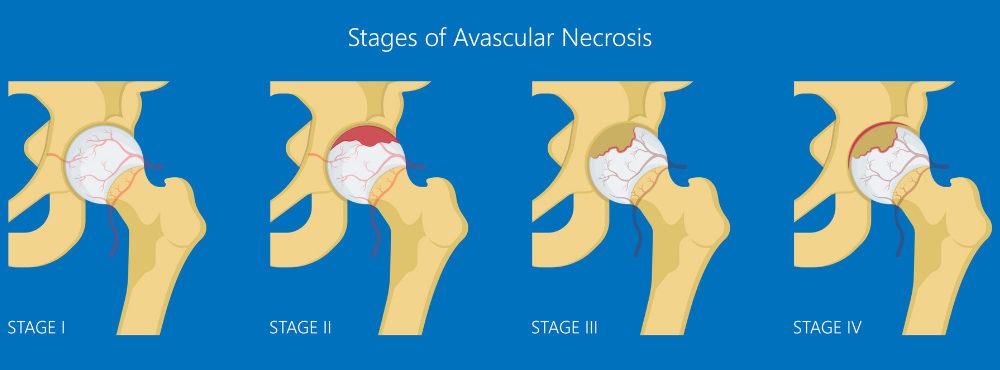What is avascular necrosis (AVN)?
The articulation of the head of the femur (thigh bone) into the socket of the acetabulum (pelvis) forms the hip joint. The ends of these bones are blanketed in a slippery white connective tissue (articular cartilage) that facilitates smooth and painless joint movement. This articular cartilage is heavily reliant on an abundant vascular supply to ensure this tissue remains healthy. If the blood supply through the femoral head is damaged or interrupted, the supporting bone underneath the cartilage can gradually deteriorate and ultimately collapse. The articular cartilage is damaged with the collapse of the femoral head and a painful hip condition, known as avascular necrosis (AVN) or osteonecrosis, can develop. Men are the most commonly affected, particularly between the ages of 40 and 65 years.
What are the different stages of avascular necrosis?
Due to the gradual deterioration of the bone structure, it can take several months for avascular necrosis (AVN) to develop and progress through the four stages:
- Stage 1: Characterized by mild to moderate hip pain and the beginnings of osteonecrosis may or may not be visible on x-rays.
- Stage 2: The ball of the femur remains intact while x-rays confirm necrotic tissue.
- Stage 3: Arthritis symptoms begin to develop with the femoral head collapse visible in imaging studies.
- Stage 4: Severe osteoarthritis symptoms are experienced from the complete collapse of the femoral head.

Early confirmation of AVN is important as early treatment has been found to improve recovery outcomes. Dr. Ronak Mukesh Patel, orthopedic hip specialist serving patients in Sugar Land, Pearland, and the Houston, Texas area, has the knowledge and understanding as well as substantial experience in treating patients who have experienced avascular necrosis.
What risk factors increase the likelihood of developing avascular necrosis (AVN)?
Although avascular necrosis (AVN) can be the consequence of a traumatic injury to the hip, such as a proximal femur fracture or a hip dislocation, there are a number of non-traumatic factors that can increase an individual’s risk of experiencing AVN.
- Medications: Research has found a connection between long-term use of corticosteroid medications and the development of osteonecrosis. Medications that induce blood clotting disorders have also been shown to increase the risk of AVN.
- Alcohol Consumption: When alcohol is consumed in large quantities over a long period of time, cortisone levels can become elevated from the fatty deposits formed in the blood vessels. This can gradually reduce the bone’s vascular supply.
- Medical Conditions: Individuals with vascular disorders or diseases affecting the bone marrow are more likely to develop over time. These can include:
- Sickle cell disease
- Thalassemia
- Leukemia
- Diver’s disease (“The Bends”)
- Gaucher’s disease
- Systemic lupus erythematosus
- Crohn’s disease
- Arterial embolism.
What are the symptoms of avascular necrosis?
Patients with avascular necrosis (AVN) frequently experience pain when pressure is applied to the hip joint or the affected bone. This often begins as intermittent pain but becomes more constant and debilitating as this condition progresses. It is important to note that individuals in the early stages of AVN may not report any symptoms at all. Other common symptoms of avascular necrosis can include pain in the groin region, development of an abnormal gait or limp with walking, and pain with rotation of the hip joint.
How is avascular necrosis diagnosed?
Dr. Patel will gather a complete medical history with a focus on any previous hip injuries or other degenerative hip conditions. This interview is followed by a thorough physical examination to evaluate the hip for pain and tenderness and identify any deficiencies in joint movement or function. Diagnostic imaging studies, such as x-rays and magnetic resonance imaging (MRI), provide valuable information such as the location and extent of femoral head damage. Dr. Patel may also request additional imaging studies, such as an MRI.
What is the treatment for avascular necrosis?
Non-surgical treatment:
Patients that were diagnosed with avascular necrosis (AVN) in the early development stages may respond well to non-surgical therapies alone. Bisphosphonate medications can be used to slow bone deterioration and, over time, even improve bone density. Other medications, such as statins, might be utilized to lower the number of fatty deposits found in the blood vessels. Hyperbaric oxygen therapy can also be implemented to alleviate pain by decreasing the body’s inflammatory response.
Surgical treatment:
Surgical intervention is often recommended for early avascular necrosis (AVN) to prevent cartilage collapse and subsequent osteoarthritis. There are various surgical procedures that can be implemented by Dr. Patel, such as:
- Core Decompression: The goal of this procedure is to relieve any pressure on the femoral head and restore blood flow back to the hip joint. This is accomplished by drilling several small holes that create channels for new blood vessels.
- Osteochondral Graft: A bone and/or cartilage graft can be harvested from the patient (autograft) or donor tissue (allograft) to reconstruct the damaged bone or cartilage tissue. This procedure is often combined with core decompression to improve recovery outcomes.
- Vascularized Bone Graft: This procedure removes a portion of the fibula (smaller lower extremity bone) with the associated blood supply intact. The bone and vasculature are then integrated into the femoral head.
- Total Hip Replacement: This surgical procedure is reserved for patients with advanced AVN with articular cartilage damage and osteoarthritis. The femoral head and cartilage are reconstructed using a metal and/or plastic prosthesis to restore hip function and joint movement.
Hip Avascular Necrosis Specialist

Avascular necrosis is a gradual deterioration of the bone structure in the hip. AVN occurs when blood supply through the femoral head is damaged or interrupted and the supporting bone underneath the cartilage deteriorates, eventually causing it to collapse. Hip avascular necrosis is a condition that needs to be treated in its early stages. AVN specialist, Doctor Ronak Mukesh Patel, provides diagnosis as well as surgical and nonsurgical treatment options for patients in Houston, Sugar Land, and Pearland, TX who have avascular necrosis of the hip. Contact Dr. Patel’s team today!


